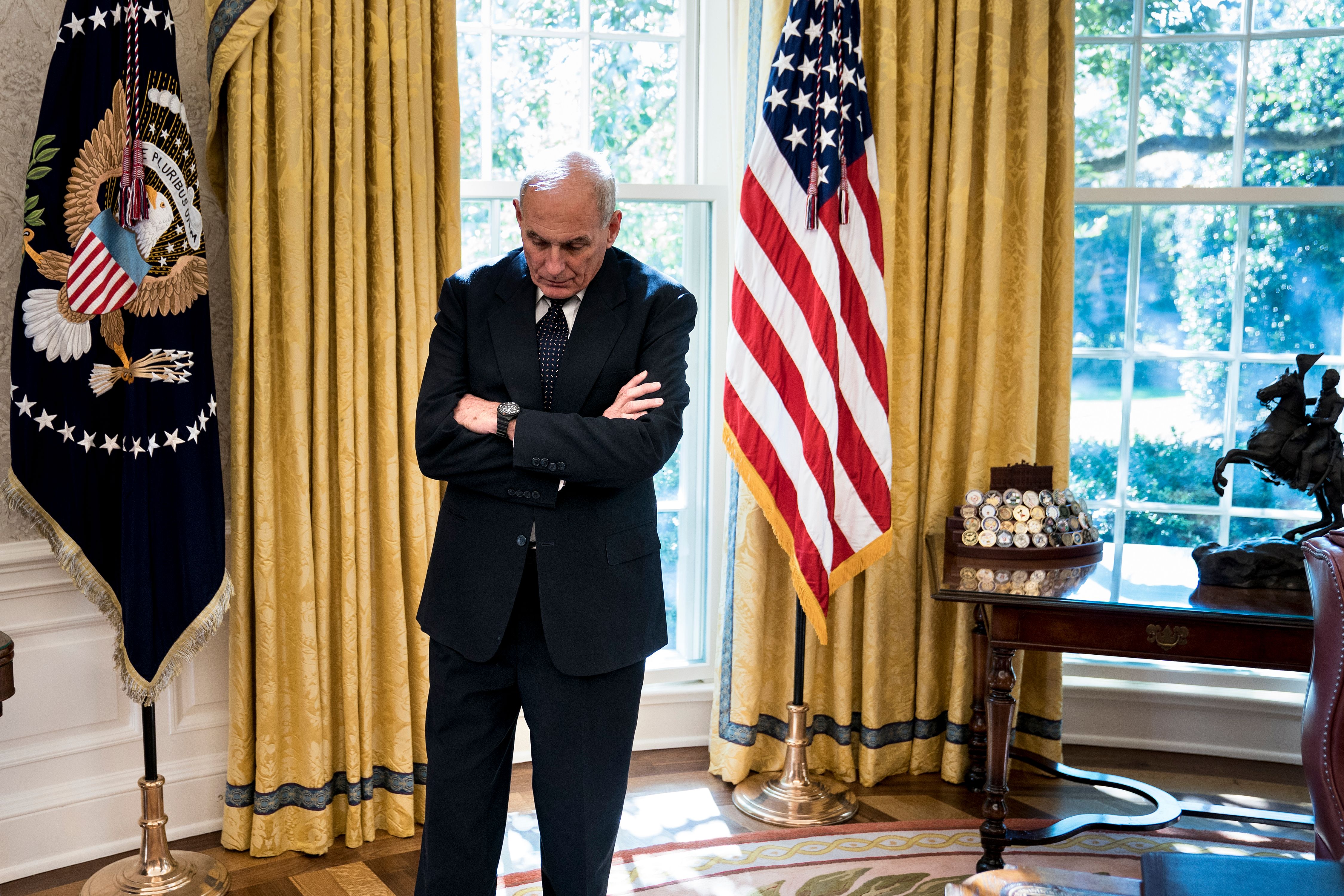The corruption of John Kelly
The White House chief of staff is a decorated general. That doesn't make him above reproach.


What happened to John Kelly?
Consider last week's extraordinary remarks by the decorated Marine general officer turned White House chief of staff. Kelly was dispatched to quell a simmering controversy about the empathy-challenged President Trump's call to the widow of one of the U.S. troops killed recently in Niger.
Many conservative pundits, desperate to find anything nice to say about the Trump administration, nearly tripped over themselves to praise Kelly. National Review's Rich Lowry hadn't been so spellbound since Sarah Palin "sent little starbursts" through his television screen. Calling Kelly "the adult in the room," Lowry said the "moving, impressive, highly informative statement" should put "an end to this whole thing." It didn't; quite the opposite, in fact. Yet two days later, Lowry was still gushing. "I think it should be studied in rhetoric classes," he wrote. Except for, er, one little "flaw": It turns out Kelly gratuitously smeared Rep. Frederica Wilson (D-Fla.), claiming she had taken credit for securing federal funding for an FBI building. (She made no such claim.) Future professors of rhetoric will have to excise that part of the speech from their textbooks!
The Week
Escape your echo chamber. Get the facts behind the news, plus analysis from multiple perspectives.

Sign up for The Week's Free Newsletters
From our morning news briefing to a weekly Good News Newsletter, get the best of The Week delivered directly to your inbox.
From our morning news briefing to a weekly Good News Newsletter, get the best of The Week delivered directly to your inbox.
It's true that, when wrenched from its explicitly political context (he was there to perform damage control), Kelly's speech was emotionally affecting, evoking as it did the memory of his own son and other fallen Americans now buried at Arlington National Cemetery. But without appearing insensitive to Kelly's loss, it must be asked how, precisely, it mitigated Trump's apparent tone-deafness toward a widow who subsequently revealed the conversation left her in bitter tears.
Like many men of his age and background, John Kelly thinks the world is going to hell in a handbasket. Nothing is sacred anymore. Not women. Not religion. Not official phone calls answered in automobile. Fine. Lord knows he's earned the right to express his opinion. But the sum total of Kelly's rhetoric amounts to a rhetoric-class grade of F for "Inapposite Handwaving."
And lest we forget, Kelly's emotionally charged, factually challenged speech was in essence a coverup of yet another Trump lie. The president had denied the underlying facts of Rep. Wilson's story ("I didn't say what the congresswoman said; I didn't say it at all"). In relating how and why he coached Trump in what to say, Kelly tacitly confirmed them.
All of this should be clear to any dispassionate observer of this unfortunate episode of our national Trumpian psychodrama. Why does Kelly's behavior — I reluctantly call it dishonorable, given the depraved nature of the man whose reputation it was designed to protect — get a pass from the right? Some of it surely has to do with the place that general officers occupy in our popular imagination. From the founding era through the Eisenhower administration, we've had our share of generals-turned-president. That makes sense: In addition to strategic intelligence and physical valor, rising to the rank of general requires no mean ability to navigate bureaucratic channels. It's a mark of political skill, in other words.
A free daily email with the biggest news stories of the day – and the best features from TheWeek.com
The right-wing fascination with generals has become especially pronounced in recent years. Indeed, it has become something of a fetish — not least for the president himself. Trump seems to relish the "from-central-casting" look of the former generals on his staff, quite apart from their impressive resumes. But the fetish predates Trump. National Review's Victor Davis Hanson published a book in 2014 likening certain generals to "saviors." William Kristol and a group of rich donors talked of "conscripting" James Mattis into the presidential race as a last-ditch attempt to thwart Trump. Mattis, of course, became Trump's defense secretary. And the likes of Hanson have taken Trump's penchant with hiring generals as proof that he "values merit over politics." (This is a particularly rich characterization of a man who brought Omarosa Manigault and Anthony Scaramucci into the White House.)
In weighing Trump's instability against the establishment of a negative precedent for over-reliance on the military, National Review's David French concluded that the risk was necessary. He resorted to a famous Aaron Sorkin-penned rhetorical flourish: "[W]e want them on that wall. We need them on that wall."
The corruption of John Kelly reminds us that, no matter how accomplished and courageous one may be, Donald Trump's generals work for Donald Trump. He needs them on that wall — truth and decency be damned.
Scott Galupo is a freelance writer living in Virginia. In addition to The Week, he blogs for U.S. News and reviews live music for The Washington Post. He was formerly a senior contributor to the American Conservative and staff writer for The Washington Times. He was also an aide to Rep. John Boehner. He lives with his wife and two children and writes about politics to support his guitar habit.
-
 Why is the Pentagon taking over the military’s independent newspaper?
Why is the Pentagon taking over the military’s independent newspaper?Today’s Big Question Stars and Stripes is published by the Defense Department but is editorially independent
-
 How Mars influences Earth’s climate
How Mars influences Earth’s climateThe explainer A pull in the right direction
-
 ‘The science is clear’
‘The science is clear’Instant Opinion Opinion, comment and editorials of the day
-
 The billionaires’ wealth tax: a catastrophe for California?
The billionaires’ wealth tax: a catastrophe for California?Talking Point Peter Thiel and Larry Page preparing to change state residency
-
 Bari Weiss’ ‘60 Minutes’ scandal is about more than one report
Bari Weiss’ ‘60 Minutes’ scandal is about more than one reportIN THE SPOTLIGHT By blocking an approved segment on a controversial prison holding US deportees in El Salvador, the editor-in-chief of CBS News has become the main story
-
 Has Zohran Mamdani shown the Democrats how to win again?
Has Zohran Mamdani shown the Democrats how to win again?Today’s Big Question New York City mayoral election touted as victory for left-wing populists but moderate centrist wins elsewhere present more complex path for Democratic Party
-
 Millions turn out for anti-Trump ‘No Kings’ rallies
Millions turn out for anti-Trump ‘No Kings’ ralliesSpeed Read An estimated 7 million people participated, 2 million more than at the first ‘No Kings’ protest in June
-
 Ghislaine Maxwell: angling for a Trump pardon
Ghislaine Maxwell: angling for a Trump pardonTalking Point Convicted sex trafficker's testimony could shed new light on president's links to Jeffrey Epstein
-
 The last words and final moments of 40 presidents
The last words and final moments of 40 presidentsThe Explainer Some are eloquent quotes worthy of the holders of the highest office in the nation, and others... aren't
-
 The JFK files: the truth at last?
The JFK files: the truth at last?In The Spotlight More than 64,000 previously classified documents relating the 1963 assassination of John F. Kennedy have been released by the Trump administration
-
 'Seriously, not literally': how should the world take Donald Trump?
'Seriously, not literally': how should the world take Donald Trump?Today's big question White House rhetoric and reality look likely to become increasingly blurred
